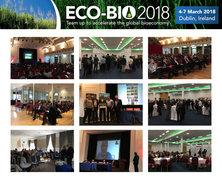
The second edition of the ECO-BIO conference, organised by BE-Basic and Elsevier, was a big success! The event, visited by over 200 representatives from about 40 countries from all over the world, took place from 4-7 of March at the Royal Dublin Society in Dublin, Ireland. Like the previous edition in 2016, the conference provided an international platform for industries, scientists, NGO’s and governments to meet and discuss the challenges and solutions to build a sustainable biobased economy from an academic, environmental and societal point of view. During a topical programme with plenary presentations and interactive forum discussions, parallel sessions and poster presentations, the participants actively discussed how to accelerate the bioeconomy.
Plenary speakers included Rob van Leen (Chief Innovation Officer, DSM), Carlos Henrique de Brito Cruz (Scientific Director, FAPESP), Mark Ferguson (Director General, Science Foundation Ireland), Goncalo Pereira (Associate professor, UNICAMP), Jeremy Woods (Lecturer in Bioenergy, Imperial College London) and Roberto Rinaldi (Senior Lecturer, Imperial College London). Luuk van der Wielen and Bram Brouwer (BE-Basic Board) chaired the event.
In 20 keynotes, over 60 oral presentations and over a 100 poster presentations the scientific progress made in developing technological solutions for the bioeconomy has been presented. The winner of the poster award, sponsored by BE-Basic, was Dr. Borges from CTBE (Brazilian Bioethanol Science and Technology Lab) with a poster on “Lignin biochar phosphate fertiliser from second generation ethanol production”.
During the plenary program an industry panel¹ chaired by Luuk van der Wielen, discussed with the audience about ‘Success factors for Biobased Innovation’. A lot of factors have been mentioned leading to the general conclusion that successful implementation of industrial biobased innovations depend on clever entrepreneurship: search for proper partnership, conduct a proper market analyses followed by carefully derisking the proper product/process/feedstock combination, combined with patience and support from the government.
Another panel² discussion was chaired by Antonis Zorpas (Head of Lab. of Chemical Engineering and Engineering Sustainability, Open University of Cyprus). This discussion focussed on the ‘Impact of the biobased economy on the environment, ecology and ecosystem’. One of the important conclusions was that global sustainability is not necessarily the same as local sustainability: we need to focus on a regionally oriented bioeconomy with local solutions. It is important to involve the general public and generate commitment and demand for biobased, e.g. by making it cool (use social media). However the panel and the audience concluded that it is still not clear what exactly sustainable behaviour is and that maybe sustainability is about reducing supply and demand beyond excess and thus determine what we need rather than what we necessarily want.
We look back at a successful ECO-BIO conference. Let’s team up and celebrate the bioeconomy at the third edition in two years!
For an impression of ECO-BIO 2018 klick here.
The Elsevier journals “Industrial Crops and Products” and “International Journal for Biological Macromolecules” will both publish a special issue linked to the ECO-BIO 2018 conference. During the conference a lot of interest was spotted and we will soon invite people to submit full articles.
¹ Andreas Taglieber (Director Biochemistry, Firmenich), Henk Noorman (Senior Science Fellow DSM, Honorary Professor Bioporces Design and Integration TU Delft), Gonçalo Pereira (Associate Professor, UNICAMP), Michael Küpke (Team leader Synthetic Biology, Lanzatech) and Roberto Werneck do Campo (Global Process Technology Academic Liaison, Braskem)
² Erik R. Coats (Director, Engineering Management Program, University of Idaho), Patricia Osseweijer (Section Leader Biotechnology and Society, TU Delft) and Bram Brouwer (Director, BioDetection Systems)

